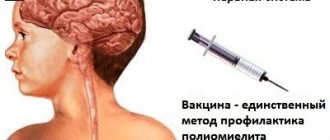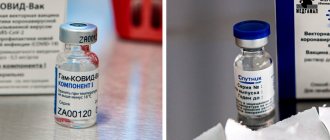Prices
Our doctors
How to get there
The current epidemiological situation in the country and in the world contributes to stricter requirements for vaccination of children who enter preschool and school institutions. Vaccination is the most reliable and effective method of preventing many infectious diseases.
Make an appointment
Please check the cost of services with the clinic’s medical consultants by phone
| Service | Price |
| Vaccinations in kindergarten or school | from 250 rub. |
Clinic specialists:
Zholobova Oksana Alexandrovna
Pediatrician
Klimenko Marina Albertovna
General practitioner, therapist, pediatrician, allergist. Participant of the TELEMEDICINE project
.
Galkina Olga Vladimirovna
Pediatrician, pediatric gastroenterologist. Participant of the TELEMEDICINE project
.
Sabirova Natalia Alexandrovna
Pediatrician
Ponomareva Olga Mikhailovna
Pediatrician
The current epidemiological situation in the country and in the world contributes to stricter requirements for vaccination of children who enter preschool and school institutions. Vaccination is the most reliable and effective method of preventing many infectious diseases.
Massive vaccinations during the Soviet era made it possible to almost completely eliminate many diseases and significantly reduce child mortality rates. Unfortunately, in modern realities, the growing anti-vaccination movement is spreading panic among parents, using unconfirmed data about the dangers of vaccines.
Modern drugs are made on the basis of weakened viruses or bacteria and do not pose a danger to the baby. They provide reliable immunity from diseases, do not cause dangerous complications and do not impair the immune system. You can receive a vaccination certificate in Odintsovo at our multidisciplinary medical center.
Mandatory vaccinations for kindergarten
The immunity of a child aged 2-4 years is still very vulnerable to various infections. Entering a preschool institution, being in contact with a large number of children, a “home” child comes under attack from all kinds of pathogens. This causes an increased risk of diseases that can cause complications.
By the age of two years, the child should have the following vaccinations:
- tuberculosis – the first days of life, carried out in the maternity hospital;
- hepatitis B – first day of life, 1 and 6 months;
- polio – 3, 5, 6 months;
- DPT (diphtheria, whooping cough, tetanus) – 3, 5, 6 months;
- measles, rubella, mumps – 12 months;
- pneumococcal infection – 2.5 months;
- hemophilus influenzae infection (for children at risk) – 3, 5, 6 months.
At 15 months, revaccination against pneumococcal infection is carried out, at 18 months - against polio and DTP, as well as hemophilus influenzae infection for children at risk. At 20 months, a second booster vaccination against polio is carried out.
Additionally, vaccinations against influenza, hepatitis A, and meningococcal infection are recommended.
Effectiveness of vaccination
This term refers to the percentage of vaccinated children who responded to the introduction of the vaccine by developing stable immunity. In some cases, the body fails to synthesize the required amount of antibodies. The effectiveness of vaccination depends on many factors, but the main ones are:
- properties of the vaccine;
- age and characteristics of the child’s general health;
- possible chronic and hereditary diseases;
- technique and timing of vaccination.
The more children are vaccinated by age in accordance with the National Vaccination Schedule, the higher the collective immunity, which is a kind of protection for children whose bodies are not able to protect themselves.
Vaccinations for employees
Workers in a number of professions also require vaccination. In particular, preventive vaccinations are carried out:
- against tularemia - persons working in agricultural and logging work;
- against brucellosis and anthrax - workers in livestock slaughter, procurement and processing of livestock products;
- against rabies - veterinarians, rangers, foresters;
- against typhoid fever - persons employed in the field of municipal improvement;
- against viral hepatitis A - medical workers, service workers and food industry workers.
How to prepare for vaccination and what to do after administration of the drug
A healthy baby does not need special preparation before vaccinations. In case of medical indications or parental concerns, the doctor will prescribe a series of examinations that will show the child’s current level of health.
There are several rules that reduce the burden on the child’s body and help make vaccination easier.
- A few days before the scheduled vaccination, do not introduce new foods into the baby’s diet.
- Walk more in the fresh air, but away from public institutions and crowds of people.
- Plan your visit to the doctor so that before vaccination the little patient is well-fed and watered at least an hour before the drug is administered.
- Limit your baby’s contacts with friends, relatives and strangers for 3-4 days to eliminate the risk of infection.
The most important thing is to stay calm. Young children have an excellent sense of the emotional state of adults, and if their parents worry and worry, they will also begin to be capricious. Bring your favorite toys or books, a drink and an extra set of clothes in case your baby gets sweaty.
Possible complications
When an infectious pathogen enters the body, it is perceived as a foreign body against which it is necessary to begin a fight. The production of protective antibodies can cause an increase in body temperature, weakness and drowsiness in the child, decreased appetite, restlessness and crying in the case of an infant.
These complications are short-lived and do not pose a health hazard. To alleviate the baby's condition, antipyretics can be used.
In order to reduce the risk of more serious complications, vaccination is carried out only for healthy children who have no contraindications. Before it is carried out, the child must undergo general tests and be examined by a doctor. If there is an elevated temperature and other signs of acute respiratory infections, vaccination is postponed until complete recovery.
Premature children, as well as those suffering from diseases of the central nervous system or other chronic pathologies, are vaccinated according to an individual schedule, taking into account their state of health.
You can obtain a vaccination certificate in Golitsyno using the services of our center. You can find out the cost of vaccination and the price of each individual vaccination on our website. To get vaccinated, you must make an appointment online or by phone.
Children's multidisciplinary medical center for children from 0 to 18 years old
05/04/2017 Before school, every future first-grader must undergo a full medical examination. Why is this being done? When a child finds himself in a new, unusual environment, he adapts to it. Each child is individual and therefore his initial psychological and physical state determines how long and how painful it will be for him to adapt to school. At school, your child will face serious physical and psychological stress, and you need to understand how ready he is for it and how to help him adapt to school. According to experts, such medical examinations help to promptly identify changes in the health status of children and respond in a timely manner to emerging problems. Also, the examination will help to correctly determine the level of permissible physical activity. A medical examination will show whether you can work with the main group of children or be exempted from physical education lessons altogether.
It is best to start a medical examination with a visit to the pediatrician. He will describe in detail which specialists you need to see before entering 1st grade, give directions for tests and a medical record form 026\u-2000. A child’s medical record is a very important document, which contains information about chronic diseases, previous infections, vaccinations received, test results and specialists visited. All information in the medical record is entered by doctors. After all the instructions have been completed, the visit to the pediatrician will have to be repeated. He will give a final conclusion. At this point, the medical examination before entering 1st grade can be considered completed.
What doctors will you have to go through?
- otolaryngologist
- orthopedist
- ophthalmologist
- surgeon
- dentist
- neurologist
- psychiatrist
- obstetrician-gynecologist or pediatric urologist - andrologist
- dermatologist
- speech therapist
— An ophthalmologist will check the future schoolchild’s vision, and if it turns out that the vision is not very good, the child will be seated on nearby desks during school lessons so as not to strain his eyes too much. They check the child’s visual acuity using a special table with pictures for children who do not know letters, and schoolchildren are already asked to name the letters.
— The ENT examines the child’s ears, throat and nose and gives his opinion if there are no pathologies. Infectious diseases of the ENT organs are very common in elementary school, so ask your doctor what to do as a preventative measure to avoid catching an infection.
— The dentist conducts a preventive examination of the oral cavity. Just at the age of 6-7 years, the first milk teeth begin to fall out and new molars begin to emerge. It is necessary to visit the dentist once every six months, make sure that your child’s bite and teeth are positioned correctly so that you don’t have to see an orthodontist later. Teach your future first-grader to take care of his teeth and gums, and then he won’t have to be afraid of going to the dentist.
— A neurologist will examine the child, and if you have complaints about irritability, excitability, stuttering or any other changes in the child’s condition, inform the doctor. The doctor also solves problems associated with headaches, restless sleep, feelings of anxiety and fear, nervous tics and attention disorders. When visiting a neurologist, it is advisable to bring an ophthalmologist’s report. At the end of the appointment, the doctor will tell you how to help your child adapt to school, not be nervous and carefully absorb information.
— An orthopedist will assess the condition of the musculoskeletal system of the future schoolchild. He will look to see if there is any curvature of the spine, poor posture, or flat feet. After the examination, the doctor will give recommendations for arranging the student’s workplace, explain how to sit at the table correctly, what kind of chair, backpack, shoes, and so on should be. He may prescribe a course of massage, or therapeutic and preventive physical education. It is often recommended to sign up children for swimming in the pool or for dancing and rhythmics.
— A psychologist determines the child’s level of development and his readiness to study at school. After all, for successful learning at school, what is decisive is not the totality of knowledge, abilities and skills (reads, writes, counts, knows a cone and a parallelepiped), but a certain level of personal and intellectual development of the child, that is, PSYCHOLOGICAL READINESS; Psychological readiness for school is a necessary and sufficient level of mental and psychophysiological development of a child to master the program in a peer group learning environment;
This general list of doctors can be expanded depending on the child’s health condition and the requirements of the school.
In addition to examination by specialist doctors, the future first-grader will need to undergo additional examinations: ultrasound of the abdominal cavity, thyroid gland, reproductive system organs, ECHO-CG, ECG, complete blood test, general urine test, feces for worm eggs, scraping for enterobiasis.
These examinations are completely justified, and parents should not consider them unnecessary. The disorders identified by these doctors may influence the choice of training method. For example, if a child speaks poorly, has a burr, or has psychoneurological disorders, it will be difficult for him to study in a regular class - most likely, he will be assigned to a correctional group.
An important point when enrolling in school is to vaccinate your child. According to the vaccination schedule for children, at 6 years old, a future first-grader needs to get a booster vaccination against rubella, measles and mumps, and at 7 years old, a second booster vaccination against tetanus and diphtheria. If the Mantoux test is negative, the child will be revaccinated against tuberculosis (BCG). Additionally, your doctor may recommend vaccination against influenza and pneumococcal infection. It is best to get vaccinated a month before the start of school. A big problem can be the fact that any vaccination was not given to the child in a timely manner. In cases where there was a doctor’s order to skip vaccinations, a note is made about this in the baby’s medical record and this is handled more easily. If the parents themselves refuse vaccination, then the child may simply not be accepted into the educational institution. There have been cases when the case went to court, but it is very difficult to win such cases. Therefore, if you categorically do not want to vaccinate your child, it is better to make sure that this is justified and recorded by the doctor in the medical record.
You should not postpone the medical examination until the last minute, as this procedure can take quite a long time. It is better to do a medical examination in advance, given that in the summer most specialists go on vacation.
Who needs this examination? - To kid!
School is a society in which the child must be able to fit into. This means that the child is ready to fulfill his new role “I am a student” in accordance with the new requirements and rules. Getting up on time in the morning, not being late for lessons, maintaining discipline, correctly perceiving the teacher and communicating with him, completing homework and assignments, building relationships with classmates, being able to subordinate one’s behavior to the laws of the children’s group - this is an incomplete list of those skills that characterize social readiness for school. And here, too, a lot depends on age! A child who is barely six years old is simply physically unable to sit still for 40 minutes of a lesson. And if his behavior is “lame” and his academic performance follows him, we should think about whether it was too early to entrust the baby with the role of a schoolchild.
Understanding the picture of a child’s development and the level of readiness for learning in all aspects of his mental and physical development, you can:
- set the emphasis in a timely manner and prepare the child for school correctly and purposefully;
- take a balanced approach to the choice of educational institution and program in which the baby will study;
- consciously decide to start education at the age of six and a half or seven and a half;
- to do everything that depends on us so that the future first grader studies successfully and with pleasure!
You can issue a medical card form 026\у-2000 and undergo specialist examination in our clinic.
Be healthy!










